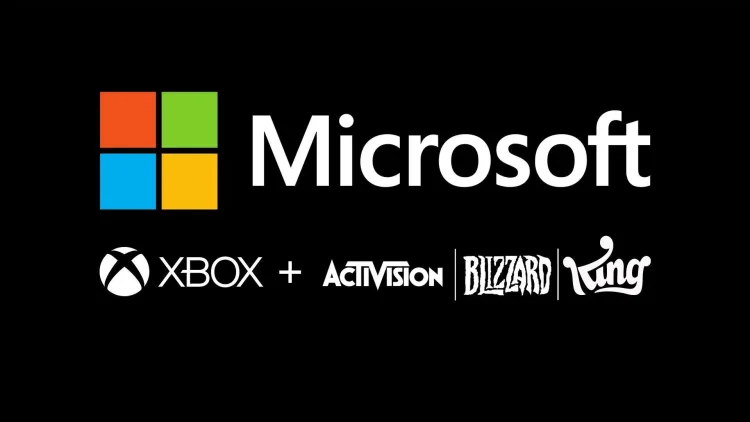The Imminent Cloud Gaming Shift: The Secret Behind CMA Rejection of Microsoft's Activision Acquisition Deal
The decision by the British Competition and Markets Authority (CMA) to reject Microsoft's acquisition of Activision Blizzard was shocking to everyone. However, the biggest surprise was the unexpected reason behind this rejection, which revolved around "cloud gaming." In this article, we will delve deep into understanding the motive behind CMA's rejection of the largest acquisition deal in history.
The Impending Transformation!

First and foremost, we must acknowledge that the era of cloud gaming is undoubtedly coming, with a 99% certainty. While consumers may not fully grasp this shift yet, companies are well aware of it, even those not traditionally associated with the gaming industry, such as Google with its former Stadia service, Amazon with Amazon Luna, and many more examples. This trend extends to individuals as well, with numerous mobile cloud gaming applications emerging that you may not have heard of before.
Everyone wants to make their mark before the impending shift, and since commerce thrives on seizing opportunities, attempting to establish your presence now ensures your ticket into the industry before a major player dominates and closes the door on competition. In this case, losses are just a "benchmark" measuring the feasibility of entering this market and are not considered genuine failure.
Examples like Stadia are not surprising failures but were, in fact, anticipated by Google before entering a new market. While Stadia did not emerge unscathed, it gained valuable experience that could be leveraged in the future to enhance gaming experiences in its other services, such as YouTube. It also opens up new creative ideas that may ultimately lead to profit.
An Unexpected Scenario!
The cloud gaming transformation also means that unexpected companies, such as SpaceX, could enter the market. Yes, what you may not imagine could happen. One of Elon Musk's empire companies, SpaceX, could begin to establish its dominance in the gaming industry through its "Starlink" service, providing internet via satellite technology. This expansion could extend the reach of cloud gaming services to various corners of the world, integrating them with Starlink and potentially increasing their cost. Many unforeseen possibilities could arise.
Imagine, dear reader, the number of companies secretly planning for this impending shift, awaiting the decisive moment to unveil their capabilities in the "cloud gaming" era, which may last for centuries.
The Xbox Game Pass Plan and the Future of the Xbox Brand and Home Consoles
We have always known Sony to be at the forefront of innovation, consistently striving to introduce the most cutting-edge ideas and technologies, placing it in the lead of the competition. Microsoft has recently adopted a similar approach by shifting its vision for the Xbox brand towards a brighter future. However, this transformation comes at a considerable cost.
Microsoft has redirected its full focus on transitioning the Xbox brand towards cloud gaming through the Game Pass service. This shift has been hinted at by Phil Spencer on multiple occasions, with Xbox now competing for the future. By making Game Pass accessible on all smart devices, and most recently on smart TVs in mid-2022, and even via web browsers, Microsoft is determined to compete with the likes of Netflix.
What Microsoft Aims to Achieve
Netflix is the target for the Xbox brand's future. It aims to make Game Pass accessible to all segments of society, and to achieve this goal, Microsoft has made Game Pass the cornerstone of its strategy. It has increased efforts to secure exclusive titles from acquired studios, even incurring initial losses to deliver the final blow.
Won't This Be Costly?
Certainly! However, the returns from this sacrifice will be manifold. Microsoft is one of the largest companies in terms of market capitalization, so its ambitions are anything but ordinary. This is evident from the massive capital allocation of up to $70 billion, indicating the magnitude of the long-term benefits this plan is expected to yield.
A Devious Plan?
Bringing games to the Game Pass service sets an important precedent, incorporating them into the "Xbox Cloud Gaming" service, which Microsoft sees as the winning card that justifies the losses incurred to transform the Xbox brand into a cloud service accessible to everyone, much like Netflix.
Microsoft consistently states that acquisitions of game companies do not mean that their games will be restricted to its platform alone but rather emphasizes the idea of cross-platform play. However, the bigger question lies in Microsoft not mentioning the availability of these games on other cloud gaming services apart from "Xbox Cloud Gaming."
Microsoft intends to limit games to its cloud platform only!
The effectiveness of this plan will only be realized in an era dominated by cloud gaming, not just a shift but a complete transformation of millions of gamers to "cloud gaming," abandoning home consoles and PCs. This is what Xbox is trying to achieve from now on, even with many sacrifices. It also leaves room for a major player like PlayStation to dominate this market.
Do you now understand, dear reader, CMA's stance on the rejection?
The CMA decision regarding the rejection of the Activision acquisition The British Competition and Markets Authority recognized that the era of cloud gaming is inevitably approaching in the near future. It understood that whoever controls this era will have the upper hand. Based on this, it provided a more logical reason for rejecting the acquisition of Activision – that these games would be exclusively available on their cloud services.
However, let's step back a bit. When Microsoft unexpectedly announced, during the CMA's review of the acquisition, that it had signed a deal with Nvidia to bring the Game Pass service to its cloud platform "GeForce Now," it was undoubtedly suspicious timing. Moreover, it appeared to be a clever diversion. This deal gave the impression that Microsoft was making its titles available on another cloud service apart from "Xbox Cloud Gaming."
In reality, GeForce Now is more of a "bridge" platform and not an independent service. It requires you to purchase the game on another platform like Steam and then link your account to the service to stream the game. Bringing Game Pass to GeForce Now also follows a similar approach.
Undoubtedly, CMA saw through this devious scenario, and shortly thereafter, we were surprised by the decision to reject the deal!
What Is the Extent of the Damage from the Deal's Success?
Once the complete cloud gaming transformation begins, and home platforms lose their value, Game Pass, armed with an extensive lineup of exclusive titles from acquired studios, supported by Microsoft's extensive experience in the technology and cloud field, will provide an unparalleled cloud gaming service.
The success of this plan's damage may result in the elimination of competition, especially when services like PlayStation Plus won't be able to compete in an era dominated by cloud services. This is likely what CMA inferred from the Activision acquisition deal.
Do you think CMA's stance truly serves the consumer's interest? Share your thoughts."














